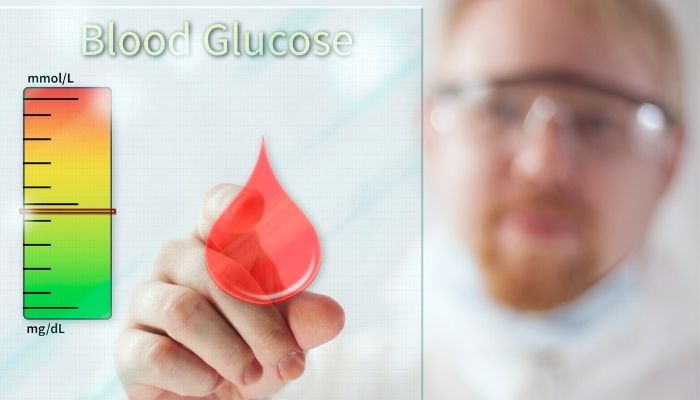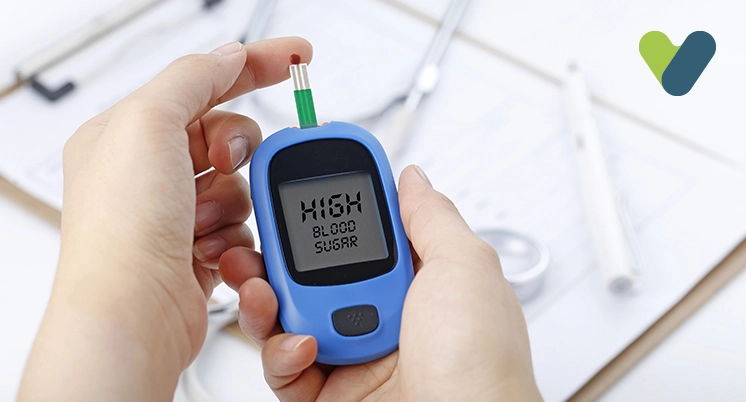Diabetes is a health condition that disturbs your body’s ability to either produce or utilize insulin. Diabetes results in higher blood sugar levels (glucose levels) than normal. If glucose level goes too high, then you may suffer from various diseases, including heart disease, nerve damage, kidney disease, and eye problems. A diabetes test will help you in the early detection of diabetes so that you can take the proper line of treatment. This test is also known as the glucose tolerance test or HbA1c blood test or glucose screening test.

The cost of the diabetes test is Rs. 300-Rs.1000. The price may vary depending on your location.
Test Summary
| Also known as | Glucose tolerance test, random sugar test, glucose screening test, oral glucose tolerance test |
| Test Type | Blood |
| Diabetes test includes | To check the sugar levels in your blood |
| Preparation | Fasting of 10-12 hrs. may require |
| Reporting | Within 24 hrs |
| Test price | The cost of diabetes test is between Rs. 300 to Rs. 1000 but it may vary state to state and lab to lab |
| Also included in | Health Insurance Plans |
| Related tests | Complete blood count, kidney function test |
Who Should Go for this Test?
In the earlier stage, you may not experience any symptoms of diabetes. You can go for this test if you experience the below-mentioned symptoms.- Feeling thirsty or extremely fatigued
- Frequent urination
- Blurred vision
- Sores or cuts that take a longer time to heal
- If you have hypertension, high triglycerides, low HDL cholesterol, or heart disease
- You have a family history of diabetes
- You have a personal history of abnormal blood sugar levels
- You lead a sedentary lifestyle
- If you are a woman with a history of the polycystic ovarian syndrome (PCOS) or gestational diabetes
Blood Tests for Diabetes
1. A1C Test
This blood test checks the levels of blood sugar in your body. This test is also known as the glycated hemoglobin test and it estimates blood sugar levels for 90 days. For this test, you don’t need to fast.Results
- Less than 5.7 percent are normal
- Between 5.7 and 6.4 percent indicate prediabetes
- Equal to or greater than 6.5 percent indicate diabetes
2. Random blood sugar test
This test can be done at any given time, irrespective of when you ate last. Results equal to or greater than 200 milligrams per deciliter (mg/dL) indicate diabetes.3. Fasting blood sugar test
To conduct this test, you need to have fasted overnight. This means you can’t eat anything for at least 8 to 12 hours:Results
- Less than 100 mg/dL is normal.
- Between 100 and 125 mg/dL indicate prediabetes
- Equal to or greater than 126 mg/dL after two tests indicate diabetes
4. Oral Glucose Tolerance Test
This test is generally performed for two hours. The technician will collect your blood initially, and then you need to drink a sugary beverage. After two hours, your blood sugar levels are tested again:Results
- Less than 140 mg/dL are normal
- Between 140 and 199 mg/dL indicate prediabetes
- Equal to or greater than 200 mg/dL indicate diabetes
5. Urine Testing for Diabetes
Though this test is not used to diagnose diabetes still, your doctors may recommend this if you have type 1 diabetes. The body produces ketone bodies instead of blood sugar when fat tissue is utilized for energy. This test is performed to identify these ketone bodies.If ketone bodies are present in moderate to large amounts in the urine, then your body can’t produce adequate insulin.


